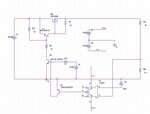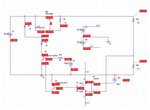Sajjadkhan
Full Member level 5
- Joined
- Sep 25, 2010
- Messages
- 307
- Helped
- 17
- Reputation
- 34
- Reaction score
- 16
- Trophy points
- 1,298
- Location
- Rawalpindi,Pakistan
- Activity points
- 4,199
op-amp for my power supply,current sense?
Hi! i am making my own lab power supply 0-30V and 3-4 amps.
First thing i am stuck in is the current sense.
I know how to sense current but the problem is i want to use presion 0.1 ohm resistor. measured current resolution would me 10mA. so 10mA x 0.1 = 1mA.
previously i was using lm358 i also have lm158 but there offset voltage does not go below 5mV. so you guys know any LM series of op-amps which has 1mV of offset even at higher temperature. max ambient temperature here in summer climbs to 40 degree C.
Another option is to use 0.5 ohm resistor to get the required offset voltage but naaaa i don't wana generate extra heat + keeping the resistor size small and i want that R.sense to PCB mount, not on any heat sink, it will look ugly and add more weight.Thanks.
*note: LT and MAX series are not in my country, AD series might be.
Hi! i am making my own lab power supply 0-30V and 3-4 amps.
First thing i am stuck in is the current sense.
I know how to sense current but the problem is i want to use presion 0.1 ohm resistor. measured current resolution would me 10mA. so 10mA x 0.1 = 1mA.
previously i was using lm358 i also have lm158 but there offset voltage does not go below 5mV. so you guys know any LM series of op-amps which has 1mV of offset even at higher temperature. max ambient temperature here in summer climbs to 40 degree C.
Another option is to use 0.5 ohm resistor to get the required offset voltage but naaaa i don't wana generate extra heat + keeping the resistor size small and i want that R.sense to PCB mount, not on any heat sink, it will look ugly and add more weight.Thanks.
*note: LT and MAX series are not in my country, AD series might be.
Last edited:

